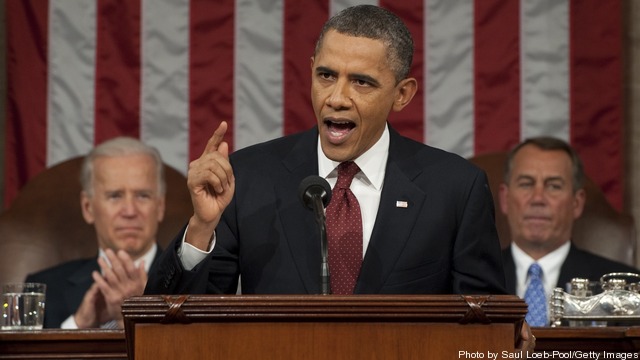
President Obama outlined new plans Wednesday to support the sales and use of alternative-fuel vehicles — including cars and trucks that run on hydrogen and natural gas instead of just those that run on electricity. The plans are part of a $1 billion National Community Deployment Challenge intended to support the use of natural gas and other alternative fuel technologies, in addition to plug-in vehicles. The president also announced separate incentives to encourage individuals and businesses to purchase alternative-fuel vehicles.
Obama
Sign up and get Breaking Energy news in your inbox.
We will never sell or share your information without your consent. See our privacy policy.
 Men with Cabot Oil and Gas work on a natural gas valve at a hydraulic fracturing site on January 18, 2012 in South Montrose, Pennsylvania.
Men with Cabot Oil and Gas work on a natural gas valve at a hydraulic fracturing site on January 18, 2012 in South Montrose, Pennsylvania.
The oil and gas industry is facing a traffic jam of federal regulators rushing to regulate hydraulic fracturing, and industry representatives says the Obama administration needs to do more to consolidate new rulemaking. Keep reading →
The Crucial Need for Alternative Infrastructure Funding in a Challenged Economy
By Cindy Wallis-Lage
In his January 23 State of the Union address, President Obama emphatically pointed out that it was public research dollars that helped develop the technologies to extract natural gas from shale rock, “reminding us that government support is critical in helping businesses get new energy ideas off the ground.”
Presumably, the President also understands that it is a two-way street. While public investment has created mutually beneficial opportunities for private companies, private companies should closely partner with the public sector whenever opportunities for their participation present themselves. Keep reading →

President Barack Obama delivered the State of the Union address to Congress in late January. The speech is being characterized by many in the media as many things: populist in tone, a campaign year positioning speech, and a mild tongue-lashing for Congress. While all of these things may or may not be true, for those of us in the energy world, the speech had some notable energy components worth mentioning.
First, the very fact that energy played a prominent role in the president’s framing of key measures to help build an “America built to last” is important and correct. Affordable and reliable energy has always been a staple of American economic growth and will continue to be so for the foreseeable future. With all of the other issues plaguing government right now, energy could easily have been downgraded to a lesser priority, but it wasn’t. Keep reading →
Newt Gingrich Urges Keystone Pipeline Approval, Drilling Expansion To Lower Gas Prices
By Peter Gardett
Newt Gingrich is attempting to revive his faltering campaign for president by attacking President Barack Obama’s energy policy. In a column in the conservative blog Human Events Wednesday, the former House speaker urged the approval of the Keystone XL pipeline project, the expansion of domestic oil and gas drilling, and the elimination of the Environmental Protection Agency, in order to help drive gas prices down to $2.50 per gallon. “The Obama administration’s ideological refusal to expand American energy production continues to block the development of resources which could lower gasoline prices dramatically,” Gingrich wrote. “As we saw most recently with the administration’s rejection of the Keystone XL pipeline, the president is more interested in playing favorites with environmental extremists rather than embracing the ‘all-of-the-above’ strategy that could achieve energy independence and help all Americans now.”

In a quiet shift from the past two years, President Barack Obama’s 2013 budget includes no new money for the Department of Energy loan guarantee program, the same program that House Republicans have scrutinized for losing more than $500 million in taxpayer dollars to the now-defunct solar power company, Solyndra. Obama has regularly included huge increases to the program’s loan guarantee authority in his budget, though Congress has not approved his proposals. He provided a $36 billion increase for nuclear reactors in his 2011 budget, and again in his 2012 budget. He also included $200 million in credit subsidies for renewable and energy efficiency projects in his 2012 budget. This year, he provided nothing.
President Requests $650.8 Million for Fossil Energy Programs http://go.usa.gov/Qmq fossilenergygov

President Obama unveiled a $3.8 trillion budget request Monday that hikes taxes on the rich, spends new money on infrastructure and education, but does little to reform the entitlement programs that pose the biggest long-term threat to the federal budget. “We built this budget around the idea that our country has always done best when everyone gets a fair shot, everyone does their fair share and everyone plays by the same rules,” Obama said in his budget message. But the budget forecasts a deficit for fiscal year 2012 that will top $1.3 trillion, before falling in 2013 to $901 billion, or 5.5% of gross domestic product. The deficit projections, which have hovered near $1 trillion for each year of the Obama presidency, mean that Obama will not satisfy his 2009 promise to half the deficit by the end of his first term.

The US wind industry, seeking to prolong its decade-long construction boom, wants renewable energy subsidies added to any deal between Congress and the White House that extends a payroll tax cut through the rest of this year.
“This is our best chance to get this done,” says John Purcell, a vice president at Leeco Steel, a Chicago-area company that makes the steel used in wind-turbine towers. “It’s today, it’s this payroll tax cut bill.” Keep reading →

In his third state of the Union speech, President Obama kept energy as “pillar” of economic recovery and made natural gas the pivot point.
While endorsing an “all of the above” energy strategy, he added little new from the policies of the last three years, and no real surprises. Keep reading →
